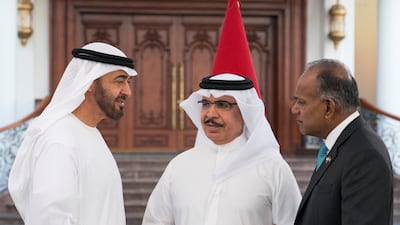UPDATE: UAE, Saudi Arabia and Kuwait give $10bn to support Bahrain reforms
The UAE has extended $833 million in support to Jordan as part of a $2.5 billion package being provided along with Kuwait and Saudi Arabia to help stabilise the economy amid record debt levels and unemployment.
The three countries deposited more than $1bn in Jordan's central bank on Thursday as part of the package, with $333.3m each from the UAE and Saudi Arabia, and $500 million from Kuwait, according to a government statement.
Crucially, the package includes a combined $600m in credit guarantees to help Jordan secure World Bank financing for infrastructure projects and other development initiatives.
The agreements were signed in Amman on Thursday by Jordan's Minister of International Co-operation Mari Kawar and UAE Minister of State for Financial Affairs Obaid bin Humaid Al Tayer, Saudi Finance Minister Mohammed bin Abdullah Al Jadaan and Kuwaiti Finance Minister Nayef Al Hajraf.
The Gulf nations were delivering on promises of assistance made during a summit held in Mecca in June as Jordan was experiencing nationwide protests over economic conditions, government austerity measures and a proposed income tax.
King Abdullah II expressed his appreciation to the UAE, Saudi Arabia and Kuwait during a meeting with the three ministers at Al Husseini Palace in Amman on Thursday, according to Jordan's Petra news agency, and stressed the “deep” brotherly bonds between their countries.
As part of the aid package, the UAE extended a $250m grant to be paid to the Jordanian government over five years and a $50m loan to finance development and infrastructure projects in Jordan. The UAE's assistance package will be managed by Abu Dhabi Fund for Development, the state news agency Wam said.
Besides the central bank deposit, Saudi Arabia also agreed to provide Jordan with $250m over five years, while Kuwait pledged $500m over the same period for infrastructure projects as well as a $300m loan with a 15-year grace period to help Jordan balance and reschedule its outstanding loans.
That UAE, Saudi and Kuwaiti officials were scheduled to travel to Bahrain next to provide up to $10bn in financial aid to Manama. Bahrain's economy, the smallest among the GCC states, has been affected by lower crude prices since 2014.
Mr Al Tayer, Minister of State for Financial Affairs, said the UAE assistance to Jordan was under the framework of strengthening ties on the directives of the President, Sheikh Khalifa, Vice President Sheikh Mohammed bin Rashid and Sheikh Mohammed bin Zayed, Crown Prince of Abu Dhabi and Deputy Supreme Commander of the Armed Forces.
Mr Al Tayer said the aid was to support development projects to revitalise the Jordanian economy and spur sustainable economic development and growth, as well as enable Jordan to enact priority infrastructure projects in key sectors.
Highlighting the “brotherly bonds” between the states and Jordan, Jordan’s Deputy Prime Minister Rajai Muasher said the assistance would help the kingdom overcome the economic and financial challenges it faces as a result of the impact of instability in the region and in neighbouring states.
Jordan currently faces a debt crisis, with its debt hovering at about 95 per cent of GDP, and the government facing a $750m budget deficit and several loan repayments beginning next year.
Jordan agreed to implement tax increases and austerity measures with the IMF in 2016 as part of a $723 million loan programme. The government abolished fuel and bread subsidies and raised electricity tariffs by as much as 50 per cent at a time when unemployment is at a near-record high of 18.7 per cent.
Attempts to do away with thousands of dollars of tax exemptions for families and impose income tax of up to 5 per cent on employees and 40 per cent on businesses ignited fierce opposition across the country that brought down the government in June.
An attempt to reintroduce the law last month again triggered outrage as part of a general souring over the government of Omar Razzaz; attempts to sell the tax law at local “town hall" meeting across the country ended in pandemonium, with government ministers kicked out of towns and villages.
The percentage of Jordanians who say they expect government policies to have a positive impact on their lives dropped sharply from 76 per cent at the time of Mr Razzaz’s appointment on June 5 to 33 per cent after his first 100 days, according to a survey by the Amman-based NAMA Strategic Intelligence Solutions.
In addition to development projects, the Gulf countries have reserved $150m of their assistance for the construction of schools, which would save the Jordanian treasury millions of dollars paid in rent each year for buildings to house hundreds of schools outside the capital.
__________
Read more:
UAE, Saudi Arabia and Kuwait agree $2.5bn aid package for Jordan
EU assures Jordan of continued aid
US signs 5-year aid package with Jordan
_________

